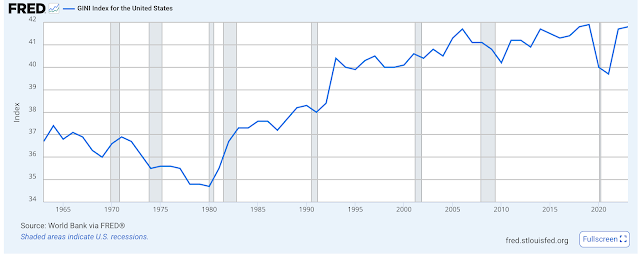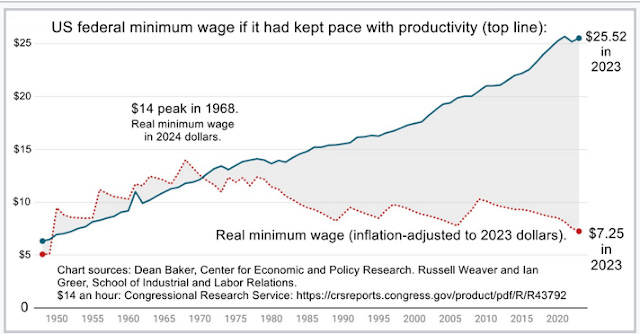Republicans won the 2024 election, and did so carrying the weight of a party leader who is a felon, an acknowledged sexual predator, a conspicuous liar, and a man who openly attempted to overturn an election to stay in power. As unpopular as Trump is, the Democratic Party brand is even less popular. Voters think Democrats stand for snooty coastal elites, not working people.
Republicans cannot escape acknowledging that the Big Beautiful Bill perpetuated significant tax cuts for the wealthiest Americans. The marginal tax rate for the highest incomes had been set to go up. The Big Beautiful Bill also cut various transfer and income-supplement programs to the working poor, including Medicaid and SNAP benefits. The rich got richer; the poor got poorer. Republicans aren't hiding this. They are justifying it. The wealthy deserve to keep what they own, and the poor are undeserving.
Our Gini index -- the measure of inequality of incomes -- even when measured after application of social safety-net programs, is high and getting higher. Notice that it dips briefly during recessions, including during the recent special benefits in response to Covid, but the trend is up. The U.S. Gini index is about 0.42. We are an outlier among developed countries, putting us amid countries like Cameroon and Uganda, and far more unequal than places Americans consider peer countries, like the U.K., Japan, Germany, and Canada, each with a Gini index of about 0.32.
Americans have gotten comfortable with the idea that certain jobs do not pay a living wage. The federal minimum wage used to set both a floor and a national expectation of fairness. Had wages stayed equal to what they were in the late 1960s, when I was young and working for about minimum wage thinning pears, fighting forest fires, cleaning dorm rooms, and checking out books, I could afford college. If minimum wage kept up, it would now be about $25/hour.
Bernie Sanders was thought radical for calling for a $15/hour minimum wage.
I pay workers at my vineyard -- all Hispanic and all legally in the U.S. -- $30/hour. They are delighted to show up to work. By market standards, I am a foolish Gringo, paying top dollar, more than other employers.
Theoretically, Democrats have an opportunity here. They might win back support from working people by making the distinction between themselves and Republicans. Republicans just sided with the wealthy getting richer and the poor getting benefit cuts. Plus, they voted as a block to keep the minimum wage at its current $7.25/hour. By contrast, Democrats might advocate for fairer wages for people at the bottom: a $20 or $25-an-hour minimum wage. Such a wage would restructure the economy and be controversial, but that controversy is a good thing. Democrats would demonstrate courage and commitment, because they would be accepting criticism and standing up to it anyway, visibly being fighters for working people. A $25/hour minimum wage would drive up the cost of fast food, hotels, food, and construction. The working poor themselves might protest that it raised prices on things they buy. The controversy would give Democrats an opportunity to make the case on behalf of the value of work. That used to be the Democratic brand. That is a better platform than arguing for the need for means-tested safety-net programs, the current Democratic go-to response. Make a brand change. Become again the party of hard work getting a fair reward. Work, not welfare. That idea resonates for Americans. Bill Clinton got elected with it amid a conservative tide.
Such a policy switch would re-position Democrats on the immigration issue, too. If Trump wants immigrant workers out of the country, then at least those jobs being vacated need to be paid well enough that native-born Americans can take those jobs and afford to live.
Would this work for Democrats? It might. It would be consistent with their stated policies. They would be fighting for working people and the value of work. But there is a problem: Americans have been spoiled. We have adjusted to having low-paid workers. We like things cheap.
The fact that it is risky means the public will notice that Democrats have returned to their roots.
[Note: To get daily delivery of this blog to your email go to: https://petersage.substack.com. Subscribe. Don't pay. The blog is free and always will be.]



2 comments:
In other words, the solution to income inequality is to pay people a fair wage.
This leaves one asking, if it's such a winning issue why don't Democrats promote it?
Campaign finance...
I suspect that the Democrats have polling data which shows them that every move they might conceivably make loses them more votes than it gains. I suspect that the Democratic coalition has become politically unworkable.
How else to explain that the only message they have managed to unify on in the past six months is Jeffrey Epstein?
Post a Comment